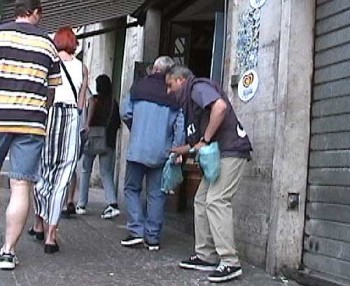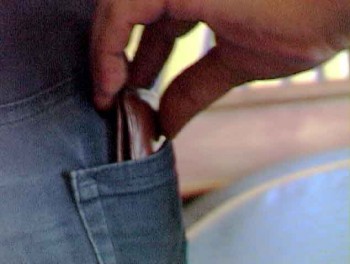Your greed + a deal too good to pass up = bait and switch:

Buy-a-Brick
“Pssssst. Come ’ere. A brand new video camera with flip-out screen. In the box. $250. Here, have a look, try it out. Look, here’s the box, and all the accessories. Battery, a/c adapter, microphone. Only $225? Mama mia! Okay, it’s yours! Here, we’ll put it in the box for you, see? And a bag so you can carry it easily. Okay, thank you very much. Here’s your bag.”
You saw him put the camera in the box. You saw him put the box in the bag. So how did you end up with a sack of salt?
A better question: What were you doing trying to buy a thousand-dollar video camera on a street corner? What were you thinking?
Yes, the seller looked like a decent man, he seemed okay. But that wasn’t his son with him, it was his partner; and their performance together is as precise as a tango. Not only that, there are four or five teams per corner in the hottest areas, competing with such subtlety you’d never suspect they’re running a scam. After all, if they let on, you’re not likely to buy from any of them.
Bait and switch
As usual, observation tells the story. The swindler approaches you with the camera and, once you take it in your hands, he summons his partner, who brings a plastic shopping bag through which you can see a box. The box is opened for you and you see that it contains the promised accessories.
How can you go wrong? You’ll take it! You place the camera in the box yourself, tuck in the flap. You dig for your cash, which you cleverly placed in a pouch beneath your shirt, or in a money belt, or in your sock. You offer the money and take the bag. You even shake hands. What a deal. What a steal!
What you never noticed was the critical switch. You were intentionally distracted for an eyeblink, while the “son” passed by with an identical box in an identical bag. The bags were swapped. It’s the classic bait and switch.
You might think it difficult to fall for a scam like this one, but it happens many times a day on a certain corner in Naples. Ship officers and crewmen are primary targets because the con men know their ships depart shortly after the purchase and it’s unlikely they’ll return. Ordinary tourists are also easily tempted.
Bob and I first observed this trick in 1994, and have watched it develop over the years to include cellphones. In the beginning we were afraid to film it. From pickpocketing and bag-snatching-by-motor scooter to extortion and murder, all crime in Naples is said to be mob-related. The Camorra, Naples’ mafia, is made up of some 80 clans and thousands of members who operate in the city. Not that Bob and I knew that when we began our audacious stake-out of these grandfatherly crooks. But the vague knowledge we had was intimidating enough for a couple of lightweights. If you want to infiltrate the bad guys, you better know what you’re doing.
Eventually we began to film from across the street, and then to acquire bits and pieces up close with an exposed camera held casually. After all, tourists carry cameras and shoot the sights, so ours wouldn’t be incongruous. The following year we were more brazen, and carried a small digital video camera hidden in a shopping bag with a hole cut for its lens. This worked fairly well, though we were nervous as a thief in the act. It was this setup that got us our first clear footage of what we’d seen with our eyes so many times: the switch.
The move is simplicity itself; its timing perfection. The salesman tries to back up to a corner of a building, usually a magazine kiosk or a phone booth, anything to shield the substitution. That allows him to lower his hand and the bag while his unseen partner does the swap.
Our first clear capture of the actual swap occurred on a sidewalk.
[Continues in next post.]
Excerpt from Travel Advisory: How to Avoid Thefts, Cons, and Street Scams
Chapter Eight: Con Artists and Their Games of No Chance














